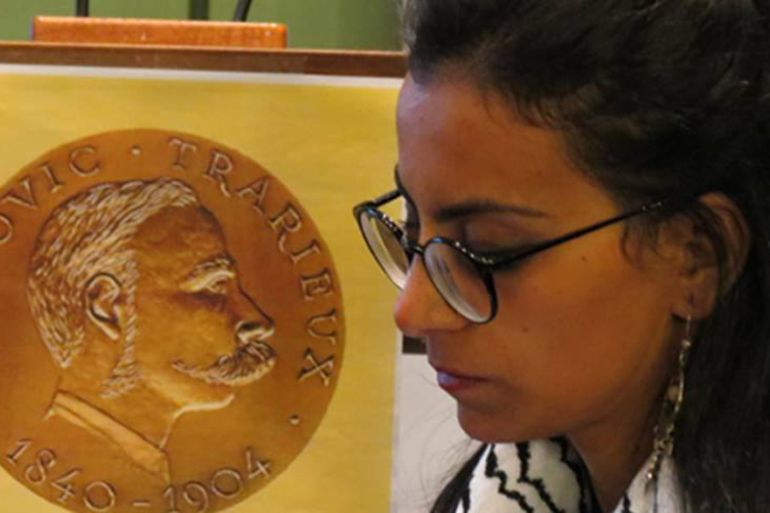Letter decries ‘atrocious’ prison conditions in Egypt
In widely criticised case, Mahienour el-Massry was jailed for protesting against police violence.

A letter from the sister of an imprisoned Egyptian activist, which describes the gruelling conditions inside one of the country’s dangerously overcrowded prisons, has shed new light on the appalling state of Egypt’s justice system.
Activist and lawyer Mahienour el-Massry is serving a 15-month prison term after being jailed, alongside several others, for participating in a protest outside al-Raml police station in 2013.
Keep reading
list of 4 itemsPalestinian Prisoner’s Day: How many are still in Israeli detention?
‘Mama we’re dying’: Only able to hear her kids in Gaza in their final days
Europe pledges to boost aid to Sudan on unwelcome war anniversary
In a letter posted to Facebook this week, Mahienour’s sister, Maysoon el-Massry, said conditions within al-Abadeya women’s prison have grown increasingly “atrocious”.
The NCHR is a government-affiliated body with no authority whatsoever ... It is not surprising that it has been unable to force the government to address prison conditions in Egypt.
“The number of prisoners in Mahie’s room has reached 27 in a room that is five metres by six metres, and in another room, the number has exceeded 30 prisoners. This literally means that the women sleep on top of each other,” Maysoon wrote in the letter, penned after she visited her sister in prison late last month.
“What makes things worse is that there is a water cut daily, and the water is only available four hours a day,” she added. “This has been the case for over a week … [and it] has, of course, affected the cleanliness of the cell. The thing they call a bathroom is completely inhumane and is present inside the room where they sleep, and, therefore, the lack of water causes a catastrophe in terms of cleanliness.”
According to a Human Rights Watch report, the Egyptian authorities detained, charged, or sentenced at least 41,000 people between July 2013 and May 2014, “straining Egypt’s prisons and aggravating hugely overcrowded conditions in the police stations and security directorates where the interior ministry now holds detainees, many of them without trial”.
RELATED: Egyptian woman describes jail conditions in letter
Under President Abdel Fattah el-Sisi, scores of people have been jailed for peacefully protesting against the government, swept up under the country’s draconian anti-protest law. Others, including several Al Jazeera staff, have been jailed for doing their jobs as journalists.
Human rights groups have documented dozens of deaths in police custody as a result of torture, physical abuse and neglect, while HRW has called on Egypt’s prosecutor general to release all detainees held solely for expressing their political views.
In what Amnesty International has decried as a “trumped-up” case, Mahienour, along with journalist Youssef Shaaban and activist Loay el-Kahwagi, were sentenced to 15 months in prison last May after being convicted of several offences related to their 2013 protest. Eight others were convicted in absentia. The group, accused of “protesting without authorisation”, “damaging police property”, “attacking the security forces”, and “threatening public security”, had been protesting against police brutality.
Many personal items have been banned from the cells at al-Abadeya prison due to a lack of space, Maysoon said, and prisoners have been told to buy the items they need from the canteen, including snacks and drinks – a prospect that is not affordable for some.

“Dear members of the Human Rights Council … I hope you are not silent,” Maysoon said in her letter, referring to Egypt’s National Council for Human Rights (NCHR), a state-run body that is tasked, among other things, with monitoring the country’s prisons.
The NCHR has received a stream of complaints about the state of Egypt’s prisons, but the organisation has been criticised for lacking teeth.
“Prisons and police holding cells are incredibly overcrowded, creating lethal conditions, especially for inmates with medical problems … [and] local human rights groups continue to allege the regular use of torture by police and national security agents,” Sarah Leah Whitson, executive director of Human Rights Watch’s Middle East and North Africa Division, told Al Jazeera, noting the NCHR has failed to enact change because it lacks independence.
“The NCHR is a government-affiliated body with no authority whatsoever,” she said. “It operates at the discretion of the government, and so it is not surprising that it has been unable to force the government to address prison conditions in Egypt.”
Follow Megan O’Toole on Twitter: @megan_otoole